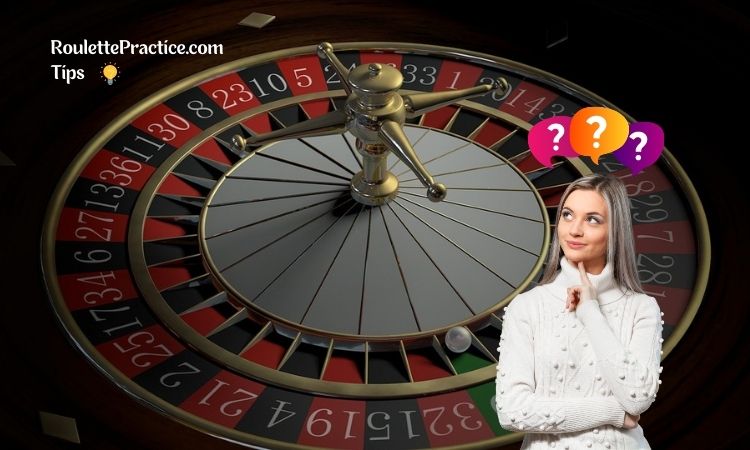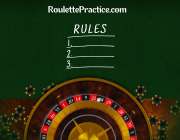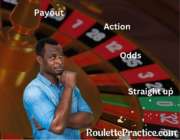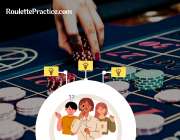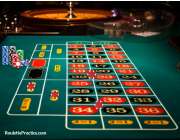
Roulette Tips to help improve your chances to win at roulette
While roulette is widely known as a game of chance, it's important to recognize that there is more to it than simply relying on luck. While the outcome of each spin is ultimately determined by random chance, there are informed decisions and strategic approaches that can improve your gameplay and potentially enhance your chances of winning.
This article is dedicated to guiding you through those strategies and providing valuable tips to help you play roulette in a more skilled and calculated manner.
Tip 1: Understand the Basics of Roulette
Master the Rules and Familiarize Yourself with the Wheel and Table Layout
To increase your chances of winning at roulette, it is essential to have a solid understanding of the rules and terminology and become familiar with the roulette wheel and table layout. Take the time to learn the intricacies of the game, including the different types of bets and their corresponding payouts.
By knowing the rules, you can make informed decisions when placing bets and avoid costly mistakes. Additionally, familiarizing yourself with the wheel and table layout allows you to quickly identify and place bets on your desired numbers or bet types, increasing efficiency and minimizing confusion during gameplay.
Click here to learn all about the rules of roulette
Understanding Roulette Bets - Inside, Outside, Odds and Payouts
Understanding the various betting options - inside and outside bets and their associated odds and payouts is essential for making informed decisions. The odds represent the likelihood of a particular bet winning, while the payouts determine the amount you'll receive if your bet is successful.
Inside bets involve betting on specific numbers or smaller groups of numbers within the roulette layout. These bets offer higher payouts but come with lower odds of winning. Examples include straight bets on a single number or split bets on two adjacent numbers.
On the other hand, outside bets cover larger groups of numbers on the roulette table. They provide higher odds of winning but offer lower payouts compared to inside bets. Common outside bets include betting on red or black, odd or even numbers, or placing bets on larger sections of the table like dozens or columns.
As beginners, it's advisable to start with simpler outside bets to build confidence and familiarity with the game. Even-money bets, such as betting on red or black, odd or even numbers, or high and low numbers, offer nearly a 50% chance of winning and a 1 to 1 payout. These bets provide a balanced and straightforward introduction to roulette gameplay.
As players gain experience and confidence, they may transition to more advanced inside bets, which offer higher payouts but involve higher risks due to lower odds of winning. For example, placing a straight bet on a single number carries a 35 to 1 payout, providing substantial returns if successful. For advanced players seeking to diversify their strategy, there is also the possibility to mix inside and outside bets to balance risk and reward.
Click here to learn all about roulette bets and their odds and payouts.
Tip 2: Set a Budget and Manage Your Bankroll
When it comes to playing roulette or any form of gambling, setting a budget is of utmost importance. Establishing a budget helps you maintain control over your finances and ensures that your gambling activities remain within reasonable limits. Without a budget, it's easy to get carried away and spend more than you can afford.
Setting a budget involves determining an amount of money you are comfortable allocating specifically for playing roulette. Consider your overall financial situation and ensure that the designated budget is discretionary funds that won't affect your essential expenses or savings.
Once you've established a budget, it's essential to manage your bankroll wisely to maximize your playing time and minimize the risk of significant losses. Here are some practical tips for effective bankroll management:
- Divide Your Bankroll: Split your budget into smaller session bankrolls. This allows you to allocate a specific amount of money for each playing session, providing structure and preventing you from overspending in a single session.
- Set Bet Limits: Determine the maximum amount you are willing to bet on each spin. Adhere to these limits consistently to avoid impulsive or reckless betting, especially during losing streaks.
- Avoid Chasing Losses: It's common for players to try to recover their losses by increasing their bets. However, chasing losses can lead to a further depletion of your bankroll. Stick to your predetermined bet sizes and avoid the temptation to chase losses.
- Consider Table Minimums: Play within your means by selecting roulette tables that have minimum bets within your budget. This allows for more extended gameplay and reduces the risk of exhausting your bankroll quickly.
Tip 3: Choose the Right Roulette Variation
When it comes to roulette, there are several popular variations that you can choose to play. Understanding the differences between these variations can help you make an informed decision and select the one that suits your preferences and potentially offers better odds. These are the three most common roulette variations:
- European Roulette: European roulette is the most widely played variation worldwide. It features a wheel with 37 pockets, numbered from 0 to 36. The numbers are colored alternately in red and black, and there is a single green pocket for the 0. European roulette typically follows the "La Partage" or "En Prison" rules, which offer certain advantages to players in case the ball lands on the 0.
- French Roulette: French roulette is another variation that is similar to European roulette, with a single zero pocket. What sets it apart is the inclusion of the "La Partage" rule, which states that if the ball lands on the 0, players who have placed even-money bets only lose half of their wager. This rule reduces the house edge and enhances the odds for players.
- American Roulette: American roulette is primarily played in North America and is similar to European roulette, with one significant difference—the addition of a double zero (00) pocket. This brings the total number of pockets on the wheel to 38. The presence of the double zero increases the house edge in American roulette compared to its European counterpart.
The house edge is a crucial factor to consider when choosing a roulette variation. It represents the statistical advantage the casino has over players. Let's compare the house edge for the different roulette variations:
- European Roulette: With a single zero, European roulette offers a house edge of approximately 2.7%. This means that, on average, the casino retains 2.7% of all bets placed.
- French Roulette: French roulette provides the most favorable house edge of the three variations. With the "La Partage" rule in effect, the house edge can drop to as low as 1.35% on even-money bets. This significantly improves the odds for players.
- American Roulette: Due to the presence of the double zero, American roulette carries a higher house edge of around 5.26%. The extra pocket increases the advantage in favor of the casino.
Considering the differences in house edge, it is generally recommended to choose European or French roulette over American roulette. The lower house edge in European and French roulette provides a better chance for players to win in the long run.
If both European and French roulette are available, French roulette is the preferred option due to the "La Partage" rule, which further reduces the house edge. However, European roulette remains an excellent choice if French roulette is not available.
Tip 4: Play with a Strategy
Developing a strategy can add an extra layer of excitement and structure to your roulette gameplay. While strategies cannot guarantee consistent wins due to the inherent randomness of the game, they can help you make more informed decisions. Here are a few popular roulette strategies:
- Martingale Strategy: The Martingale strategy is based on doubling your bet after each loss, with the aim of recovering your losses and making a profit when you eventually win. This strategy offers the potential to recover losses quickly and make a profit with a single win. However, it requires a substantial bankroll, as losses can accumulate rapidly. There is no guarantee of a winning streak, and table limits can restrict the strategy.
- Fibonacci Strategy: The Fibonacci strategy is based on a mathematical sequence where each number is the sum of the two preceding numbers (e.g., 1, 1, 2, 3, 5, 8, 13, etc.). In this strategy, you increase your bet after a loss following the Fibonacci sequence, with the idea that a win will cover previous losses. The Fibonacci strategy provides a more gradual progression of bets compared to the Martingale strategy. It can be less risky if losing streaks are prolonged. However, a long losing streak can result in significant losses, and winning may not always cover previous losses.
- Labouchere Strategy: The Labouchere strategy involves creating a sequence of numbers and betting the sum of the first and last numbers in the sequence. If the bet wins, those numbers are removed from the sequence. If it loses, the bet amount is added to the end of the sequence. The Labouchere strategy offers flexibility in setting your own betting sequence and potentially allows for more controlled progression. However, it requires careful bankroll management and discipline. A prolonged losing strea k or hitting table limits can disrupt the strategy.
While strategies can be appealing, it's important to understand their limitations. Roulette is a game of chance, and each spin is independent of previous spins. Strategies cannot overcome the fundamental randomness of the game or guarantee consistent wins. Even with a well-thought-out strategy, there will be times when the results are unfavorable. Therefor, it's crucial to approach roulette with realistic expectations and a balanced understanding of the game's nature.
Additionally, strategies are subject to limitations such as table limits, variations in betting options, and the size of your bankroll. It's vital to adapt your strategy to the specific roulette variation you're playing and to manage your bankroll effectively to mitigate potential risks.
Remember, strategies can enhance your decision-making process and provide a structured approach to gameplay, but they should be viewed as tools to guide your bets rather than foolproof systems.
Tip 5: Take Advantage of Bonuses and Promotions
One of the advantages of playing roulette at online casinos is the availability of bonuses and promotions. Casinos often offer various incentives to attract and retain players, providing you with opportunities to boost your bankroll and extend your gameplay. Understanding how to make the most of these bonuses can enhance your roulette experience significantly.
Casino bonuses come in different forms, such as no deposit bonuses or welcome bonuses for new players, reload bonuses for existing players, free spins, cashback offers, and more. These promotions can provide additional funds or perks that you can use to play roulette or other casino games.
When searching for bonuses related to roulette, consider the following tips to find the most lucrative and beneficial offers:
- Check Roulette-Specific Bonuses: Look for bonuses explicitly tailored to roulette players. Some casinos offer promotions that are specific to table games, including roulette. These bonuses may have favorable terms for roulette play, making them more advantageous than generic offers.
- Compare Different Casinos: Don't settle for the first bonus you find. Compare offers from various online casinos to identify the most generous and suitable deals. Look beyond the bonus amount and consider factors such as wagering requirements and contribution of roulette bets toward meeting those requirements.
- Review Wagering Requirements: Wagering requirements are conditions you must meet before being able to withdraw any winnings generated from the bonus. Choose bonuses with reasonable and achievable wagering requirements, as high requirements may make it challenging to benefit from the offer.
- Analyze Game Contributions: Some casinos may limit the contribution of roulette bets towards meeting the wagering requirements. Ensure that roulette wagers contribute significantly to the requirements, as this determines how efficiently you can convert bonus funds into real money winnings.
Using bonuses and promotions strategically can provide valuable advantages, allowing you to enjoy more roulette play and potentially increase your chances of success.
Tip 6: Practice and Test Your Skills
Like any skill-based activity, becoming proficient in playing roulette requires practice . While roulette is a game of chance, practicing can improve your decision-making and overall gameplay. By dedicating time to learn the intricacies of the game, you can become a more confident and competent player.
One of the best ways to practice and test your skills without risking your bankroll is by playing free online roulette games. Free online roulette games provide a risk-free environment to experiment with various strategies, understand the odds of different bet types, and build confidence in your decision-making. Take advantage of these opportunities to fine-tune your gameplay and explore the nuances of roulette without the pressure of losing real money.
And the best part is, at our site, you can play our range of high-quality free roulette games. So, why wait? Start practicing and refining your skills now.
Tip 7: Manage Your Emotions
The excitement and thrill of roulette can sometimes lead to impulsive decisions, especially during winning streaks or losing phases. It's natural to experience highs and lows while gambling, but managing your emotions effectively can help you navigate the game with a clear and focused mind. Here are some tips to help you Maintain your composure and Make rational decisions:
- Set Limits and Stick to Them: Before you begin playing, establish both financial and time limits. Knowing when to stop, whether you're winning or losing, prevents emotions from dictating your actions and helps you maintain control over your bankroll.
- Take Breaks: If you find yourself feeling overwhelmed or emotional during a gaming session, step away from the table for a short break. Taking a moment to regroup can help you refocus and make more level-headed decisions when you return.
- Practice Mindfulness: Stay present and mindful of your thoughts and emotions while playing. Being aware of any shifts in your mood can help you identify and address emotional responses that may impact your gameplay.
- Avoid Alcohol and Substance Use: Consuming alcohol or other substances can impair judgment and lead to impulsive betting decisions. It's best to play roulette with a clear mind to make rational choices.
- Refrain from chasing losses: Chasing losses, the act of increasing bets in an attempt to recover previous losses, is a common pitfall in gambling. Unfortunately, it often leads to further financial losses and emotional distress. Remember that roulette is a game of chance, and no betting system can guarantee continuous winnings.
By managing your emotions, maintaining composure, and making rational decisions, you can enjoy a more enjoyable and rewarding gaming experience. Remember that responsible gambling practices include staying in control of your emotions and not letting them dictate your betting choices.
Tip 8: Know When to Stop
Knowing when to stop playing roulette is a fundamental aspect of responsible gambling. It's essential to be aware of your limits, both in terms of time spent playing and the amount of money you're willing to wager. Setting and adhering to these limits can help you maintain control over your gambling activities and prevent potential negative consequences.
Recognizing when it's time to step away from the roulette table is vital for a positive gambling experience. Here are some signs that may indicate it's time to stop playing:
- Depleting Bankroll: If you've reached your predetermined budget or find that your bankroll is dwindling, it's a clear sign to stop playing. Avoid the temptation to chase losses or dip into funds intended for other purposes.
- Emotional Distress: Strong emotional reactions, such as frustration, anger, or disappointment, can cloud your judgment and negatively impact your decision-making. If you find yourself experiencing intense emotions, take a break and consider whether it's best to continue playing later with a clearer mindset.
- Time Limit Reached: If you've set a specific time limit for your gambling session, stick to it. Overextending your playing time can lead to fatigue and a lack of focus, potentially influencing your ability to make rational decisions.
- Chasing Losses: Trying to recover losses by increasing bets is a risky behavior that often leads to more significant losses. If you catch yourself in this cycle, it's time to stop and reassess your approach.
Remember, the key to responsible gambling is staying in control of your actions and decisions. Knowing when to stop playing roulette, whether you're experiencing losses or enjoying a winning streak, demonstrates discipline and a healthy attitude towards gambling.
As we conclude this journey through the captivating world of roulette, we've explored tips, strategies, and essential elements to help you become a more informed and skilled player. May luck be on your side as you venture into the captivating world of the roulette table! Happy spinning!
Best Casinos
A great live casino and an awesome gaming experience.
